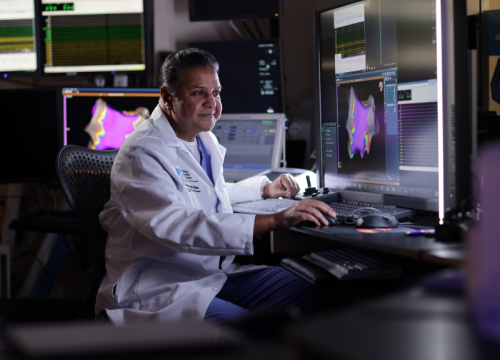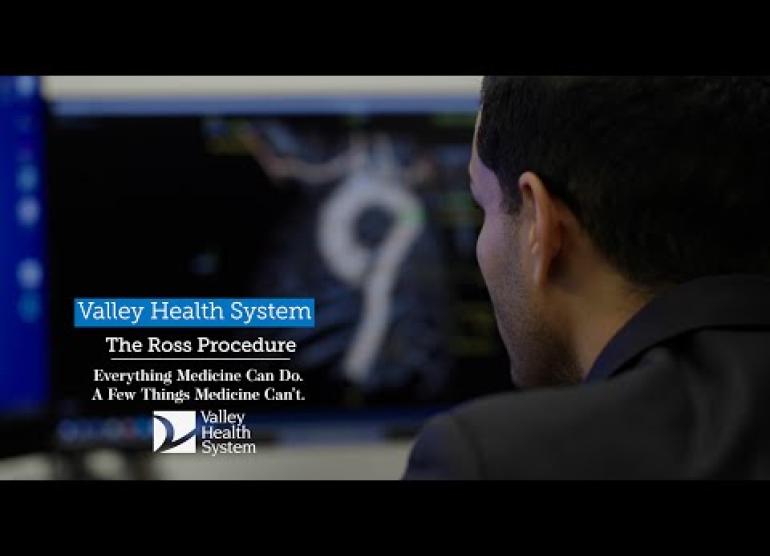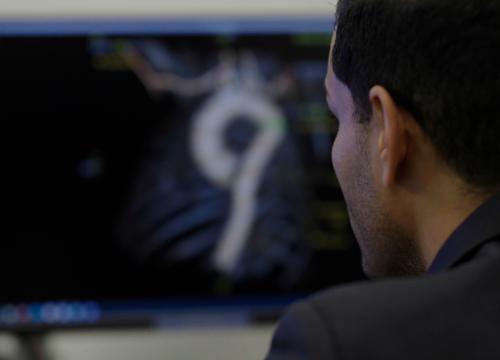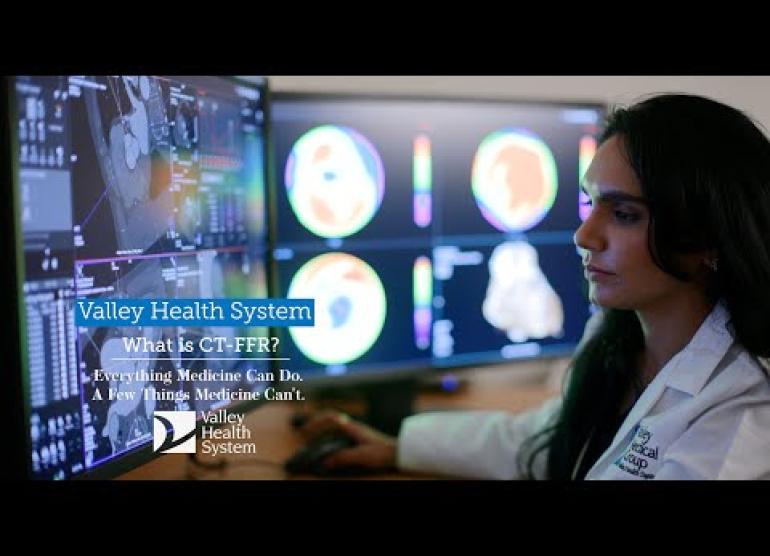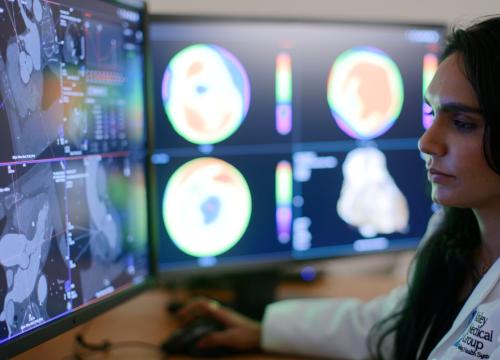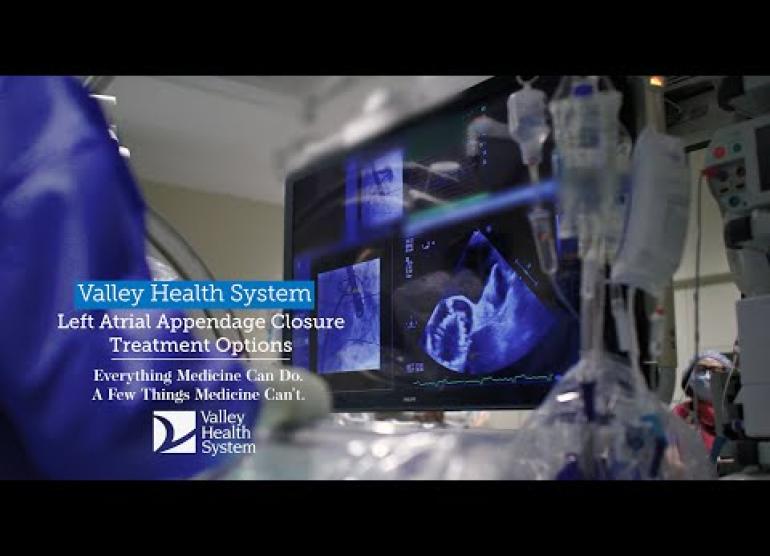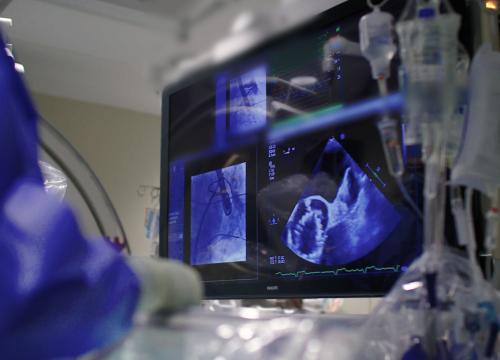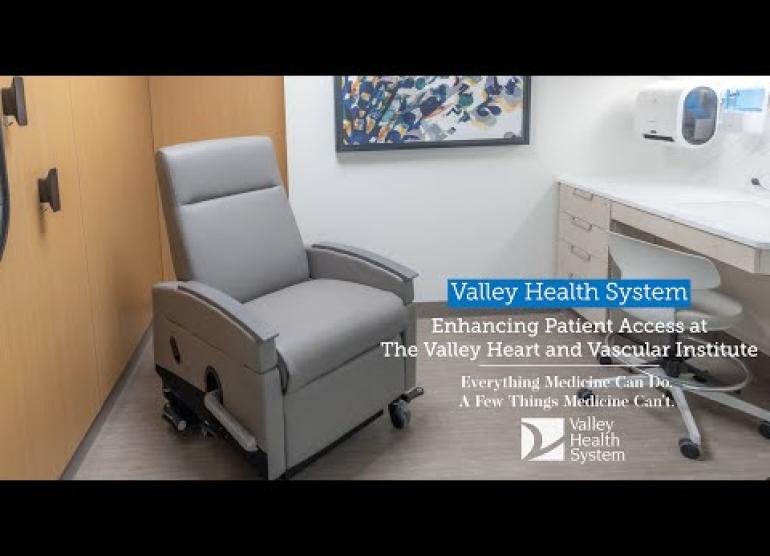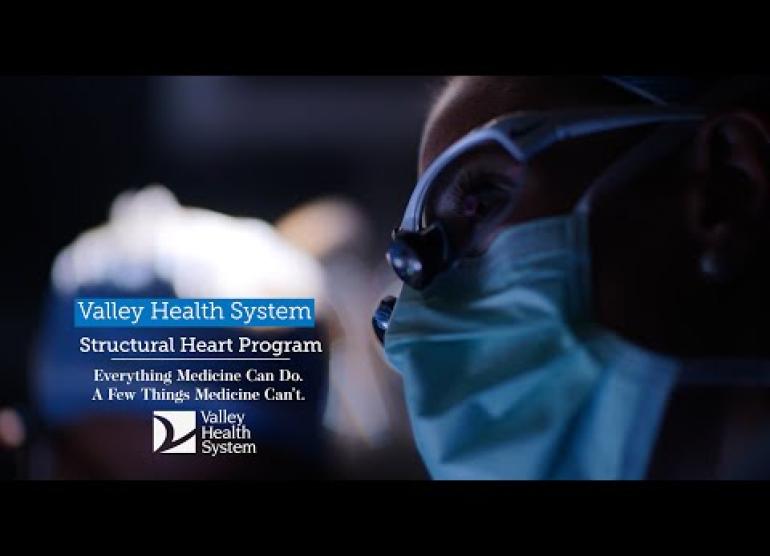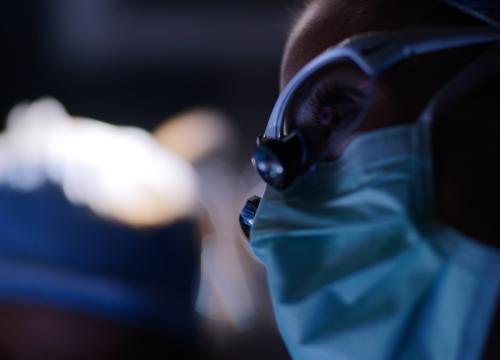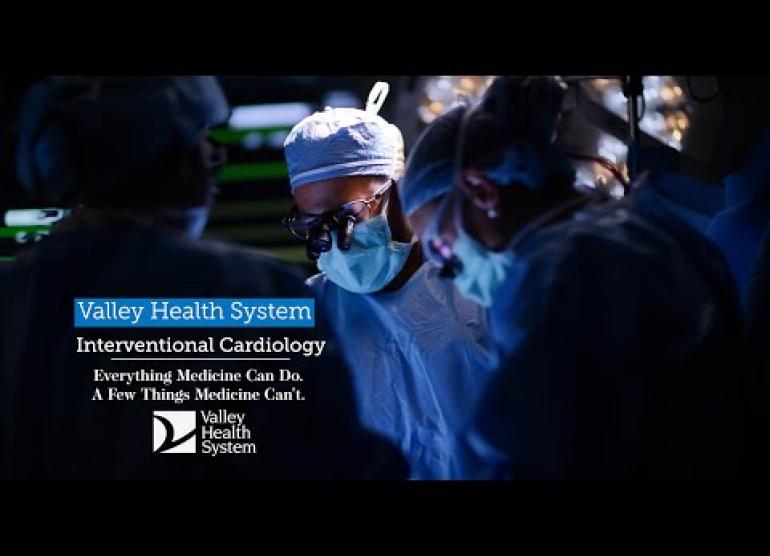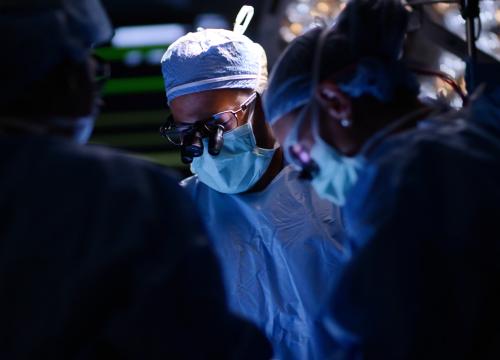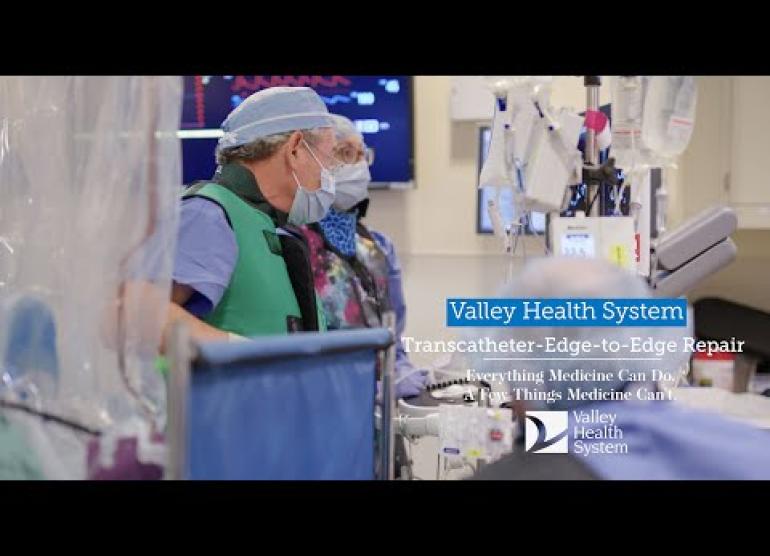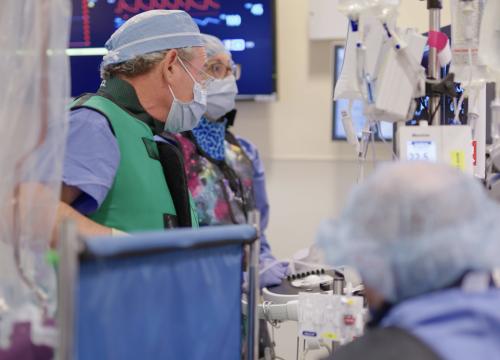New at Valley: Using AR to Guide Cardiac Ablations
WATCH: With the CommandEP augmented reality system, which creates 3D holograms for an enhanced view of the heart, Valley’s electrophysiologists perform cardiac ablation procedures with even greater efficiency and precision. Dan Musat, MD, Associate Director of Electrophysiology at Valley, explains.
Catheter ablation (also known as heart ablation or cardiac ablation) is a minimally invasive procedure for atrial fibrillation (AFib). It can also treat other types of arrhythmias (irregular heart rhythms).
During an ablation, your Valley electrophysiologist will use energy to create small scars in the heart tissue. This interrupts irregular electrical pathways in the heart that cause arrhythmias.
Valley’s electrophysiologists pinpoint the exact location in your heart to treat with ablation using the most advanced cardiac mapping systems.
Am I a Candidate for a Catheter Ablation?
Your electrophysiologist may suggest an ablation if medication does not control your arrhythmia.
A catheter ablation may be right for you if you have one of the following arrhythmias:
- Atrial fibrillation (AFib), a common arrhythmia that raises your risk for stroke
- Atrial flutter, an arrhythmia similar to AFib that also raises your risk for stroke
- Atrial tachycardia, a rapid heartbeat that begins in the upper chambers of the heart
- AV nodal re-entrant tachycardia (AVNRT), a common type of rapid heartbeat
- AV re-entrant tachycardia, a rapid heart rhythm that often goes undetected
- Ventricular tachycardia (V-tach), a very fast heartbeat that starts in the heart’s lower chambers
- Supraventricular tachycardia (SVT), which can cause your heart to race for periods of time
- Premature ventricular contractions (PVCs), which may make you feel like your heart skipped a beat
Benefits of Catheter Ablation
An ablation can help reduce symptoms of arrhythmias, such as:
- Shortness of breath
- Pounding, racing or fluttering in your chest (palpitations)
- Fainting (syncope)
- Fatigue
- Dizziness
For some people, an ablation may be an alternative to taking heart rhythm medicine. But an ablation won’t reduce your risk for stroke, which is higher if you have AFib. You’ll still need to take blood thinners to help prevent stroke.
Types of Catheter Ablation
Valley’s electrophysiologists specialize in different types of ablation to treat arrhythmias. Your electrophysiologist will work with you to determine which approach is best for you.
NEW - Pulsed Field Ablation (PFA)
Pulsed field ablation (PFA) is an alternative to traditional thermal ablation techniques. PFA delivers precise pulsed electric fields through an ablation catheter designed specifically to interrupt irregular electrical pathways in the heart that trigger AFib. This technique efficiently isolates pulmonary veins, resulting in a lower risk of collateral tissue being impacted during treatment.
Radiofrequency Ablation (RFA)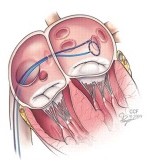
Radiofrequency ablation (RFA) uses heat to destroy small areas of heart tissue that trigger irregular heartbeats. Electrophysiologists use this type of ablation most often to treat AFib.
During RFA, your electrophysiologist sends heat to your heart through a catheter (wire) threaded through your groin. This creates small scars to help return your rhythm back to normal.
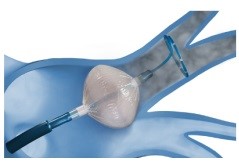
Cryoablation (Balloon Cryoablation)
Cryoablation (also called balloon cryoablation) freezes heart tissue to create scars to stop irregular heart rhythms.
During cryoablation, your electrophysiologist threads a wire with a small balloon to your heart through a vein in your groin. Then they inflate the balloon with a cold gas to freeze surrounding tissue and create a scar.
What to Expect Before Your Catheter Ablation
Here’s what you can expect before your catheter ablation:
- Do not eat or drink anything after midnight the day before the procedure.
- Tell your care team about all medicines you take, including over-the-counter medicines, herbs and supplements. They may ask you to stop taking them, but do not stop any medicines unless they tell you to do so.
- If you take a blood thinner like warfarin, do not stop your medicine unless they tell you to do so.
- If you usually wear a hearing aid, wear it during your procedure.
- If you wear glasses, bring them to your appointment.
What to Expect During Your Catheter Ablation
Here’s what you can expect if you are getting a catheter ablation:
- Ask someone to drive you to the hospital on the day of your procedure. You’ll need someone to drive you home after the procedure.
- At Valley, a nurse will start an intravenous (IV) line for your medication. They will also clean and shave the groin areas where the team will insert the catheters (wires).
- Your team will include your electrophysiologist, interventional cardiologist, an anesthesia specialist and other experts. They will perform the procedure in the electrophysiology (EP) laboratory, which has specialized equipment for ablations.
- Your anesthesiologist will give you local anesthesia to numb the groin area. They will also give you medicine through the IV to help you relax and sleep.
- Your electrophysiologist and interventional cardiologist will make small punctures in your groin to reach veins leading to your heart.
- They will thread several specialized electrophysiology catheters through the veins to different areas in your heart using a video X-ray (fluoroscopy).
- Through these catheters, they will perform an electrophysiology study to measure your heart’s electrical activity.
- Using specialized mapping systems, they will identify the type and location of your arrhythmia.
- Once they know the type and location of your arrhythmia, they will perform the ablation. They will deliver either hot or cold energy through a specialized catheter. This will create a small scar in your heart muscle that prevents electrical impulses from triggering your irregular heart rhythm.
- They will remove the catheters and put small plugs in the puncture sites to prevent bleeding. Your body will absorb these plugs as you heal.
- The procedure takes about three to four hours, although your ablation may be shorter or longer.
Recovery After Your Catheter Ablation
Here’s what you can expect immediately after your catheter ablation:
- You’ll lie down and rest in a recovery room for two to three hours. This will help prevent bleeding from the puncture sites. Then you can sit up and walk.
- Your nurse will monitor you for bleeding or swelling in your groin.
- When you are awake, your team will talk to you about your ablation results. They will also discuss how to take care of yourself when you go home.
- Most patients can go home the same day.
Recovering at Home After Catheter Ablation
Here’s what to expect when you go home after your catheter ablation:
- You may be sore and have a small bruise at the puncture sites. Over-the-counter acetaminophen and ice can help ease pain.
- You may still need to take a blood thinner after having an ablation. Your electrophysiologist will discuss your medicine regimen with you.
- Your team may provide you with an ambulatory monitoring device to wear at home. This will evaluate the results of the ablation.
- You should take it easy for a few days and avoid driving, exercise and lifting weights. Walking and climbing stairs is fine.
- After three or four days, you can gradually increase your activity. Most people can return to their usual activities within a week.
- You’ll return to your electrophysiologist’s office in a few weeks to evaluate your symptoms after the procedure. We’ll also discuss the next steps in your treatment plan.
If you still have an irregular heart rhythm after your ablation, you have options. Your electrophysiologist may recommend another ablation and other arrhythmia treatments.
Call your electrophysiologist if you have:
- Bleeding or swelling at the puncture site
- Chest pain
- Shortness of breath
- Dizziness
- Fainting or near-fainting
- Fever
- Chills
- Swallowing problems
Why Choose Valley for a Catheter Ablation?
- State-of-the-art mapping: Valley is home to several high-definition cardiac mapping systems with the best technology to find arrhythmias. This technology allows us to pinpoint the exact type and location your irregular heart rhythm. Our electrophysiologists then use that information to successfully target and treat them with ablation.
- Collaborative approach: Before you have an ablation, we’ll work with you and other specialists to address other health conditions you may have. If needed, we’ll make sure you see other experts in cardiology, imaging, sleep medicine, weight-loss management or nutrition. And if you have a complex ablation, two of our electrophysiologists will work side by side to perform your procedure. This approach can improve the success of your ablation.
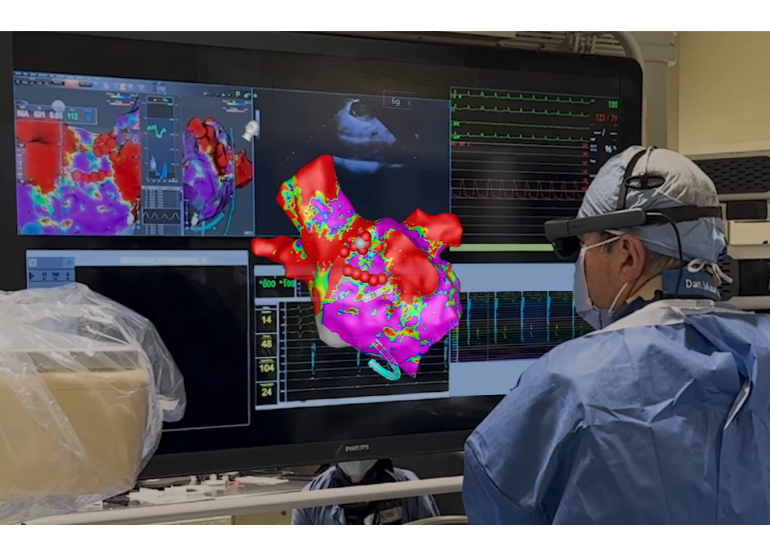 Enhanced technology: Valley has begun using the FDA-cleared CommandEP holographic cardiac ablation visualization platform (right) manufactured by SentiAR, treating the first patient in New Jersey and among the first in the U.S. Through the use of augmented reality, the system gives electrophysiologists a real-time, three-dimensional holographic view of the patient’s heart, enhancing efficiency and precision during procedures. Dr. Dan Musat leads these efforts, highlighting the importance Valley places on in improving patient safety and outcomes.
Enhanced technology: Valley has begun using the FDA-cleared CommandEP holographic cardiac ablation visualization platform (right) manufactured by SentiAR, treating the first patient in New Jersey and among the first in the U.S. Through the use of augmented reality, the system gives electrophysiologists a real-time, three-dimensional holographic view of the patient’s heart, enhancing efficiency and precision during procedures. Dr. Dan Musat leads these efforts, highlighting the importance Valley places on in improving patient safety and outcomes.- Expertise with complex arrhythmias: Our electrophysiologists have extensive experience using ablation for difficult-to-treat arrhythmias like ventricular tachycardia. Through Valley’s Snyder Center for Comprehensive Atrial Fibrillation, we offer innovative ways to treat all types of irregular heart rhythms.
- Research expertise and clinical trials: Our electrophysiologists study advanced ablation techniques through clinical trials, which are not available at many centers. For example, our team was first in the tristate area to test a new type of ablation to treat AFib. Unlike traditional types of ablation, this new technique does not use heat or cold to treat arrhythmias. Our team is also studying a new cryoablation system to treat AFib. By participating in such trials, our electrophysiologists aim to improve treatment for all people with arrhythmias.











